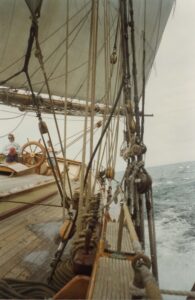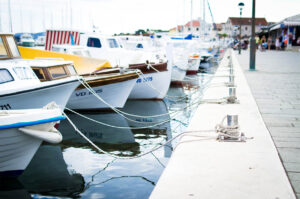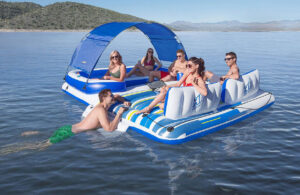There are very few recreational activities that involve as many different fields of knowledge as boating. From navigation and rules of the road to weather forecasting and vessel operations, boating education is critical and robust. Seamanship skills, handling the boat safely along with keeping all of the boat’s systems maintained and running trouble-free are just a few of many necessary know-hows. Commercial vessels have captains and engineers, navigators and deck personnel. Many of those positions are crossed-trained in meteorology and first-aid or firefighting and mechanical systems. Regardless of the size of your boat, all of these same skills are required to operate it safely.
How do we gain all of this knowledge? Some people have the benefit of growing up in a boating family, where boating education is just a part of life while others come to boating later in life. Regardless, boating education offers a lifetime of learning.
Professional mariners spend years in colleges and recertification programs to master their skills and keep them sharp.
When you master all of this, you have become a “Smart Boater.” While it takes much effort to achieve that title, the good news is that there are many educational facilities available with great resources. Learning to be a Smart Boater is worth the effort as Smart Boaters have fewer boating accidents, spend less on insurance, have fewer days interrupted by breakdowns and spend less money maintaining their boat, because they can handle minor problems before they turn into major repairs.
Smart Boaters’ boats also bring more value at resale. Ignorance is not bliss in boating; it’s expensive and could be hazardous to your health.
Most states require individuals to take a boater education course in order to operate a boat, but the government-mandated courses are primarily focused on public safety and avoiding boating accidents. Safe boat operation is only the beginning of your boating education.
If you live in the northern latitudes, you probably don’t have the luxury of using your boat year round. Why not spend some time in the off-season learning to be a Smart Boater? There are countless educational resources available to you when expanding your boating knowledge. One of the least expensive and most enjoyable is spending time with Smart Boaters. Most boaters are very generous with their time and enjoy sharing boating knowledge and personal experiences. If I can’t be on my boat, the next best thing is spending time with other boaters and discussing boats.
For those comfortable in the virtual world, the internet makes this easy with the large number of boating forums online. Forums exist for every type of boat and style of boating, from globe circling trawlers to wakeboard lake boats. Boat brands typically have owners’ clubs with a forum section on the club’s website, serving as a great place to learn from others who own the same boat as you. An amazing amount of knowledge is contained within the users of these sites. Just be sure to always verify advice given with other sources.
Another great way to learn is by attending boat-brand or boat-style rendezvous. Organizers of events like TrawlerFest or the America’s Great Loop Cruisers’ Association (AGLCA) schedule educational seminars along with social mixers at their rendezvous where you can meet likeminded boaters.
Of course, formal training in organized classes is still a great way of learning. Enterprising boating entrepreneurs run private boating schools around the country, with 24 private boating educa- tional programs just in the Chesapeake Bay alone. Many are certified through US Powerboating or its sister US Sailing Association. Some of the schools are also sanctioned by the U.S. Coast Guard to teach captain’s license courses. Another option beyond the private schools is to enroll in courses offered by the United States Power Squadrons or U.S. Coast Guard Auxiliary, as both groups offer a wide array of classes ranging from basic to advanced studies.
Boat shows frequently offer seminars to coincide with the shows, Cruisers University at the Annapolis Boats Shows and CruiserPort University at the Newport and Fort Lauderdale Boat Show are two good examples.
The last method is by hiring a training captain to spend one-on-one time with you aboard your boat. Many boaters use this to improve their docking or close quarters handling skills. Many training captains can teach much more, including navigation, giving tips on maintaining your boat or helping you learn your way around the engine room.
Benjamin Franklin once said, “Tell me and I forget, teach me and I may remember, involve me and I learn.” Become involved in your boating education, invest the time to be become a Smart Boater, it will pay many dividends.
Resources
American Boat and Yacht Council (ABYC) abycinc.org
America’s Great Loop Cruisers’ Association (AGLCA) greatloop.org
TrawlerFest passagemaker.com/trawlerfest
United States Power Squadrons beyondboating.org
U.S. Coast Guard Auxiliary usps.org
US Powerboating uspowerboating.com
US Sailing ussailing.org





